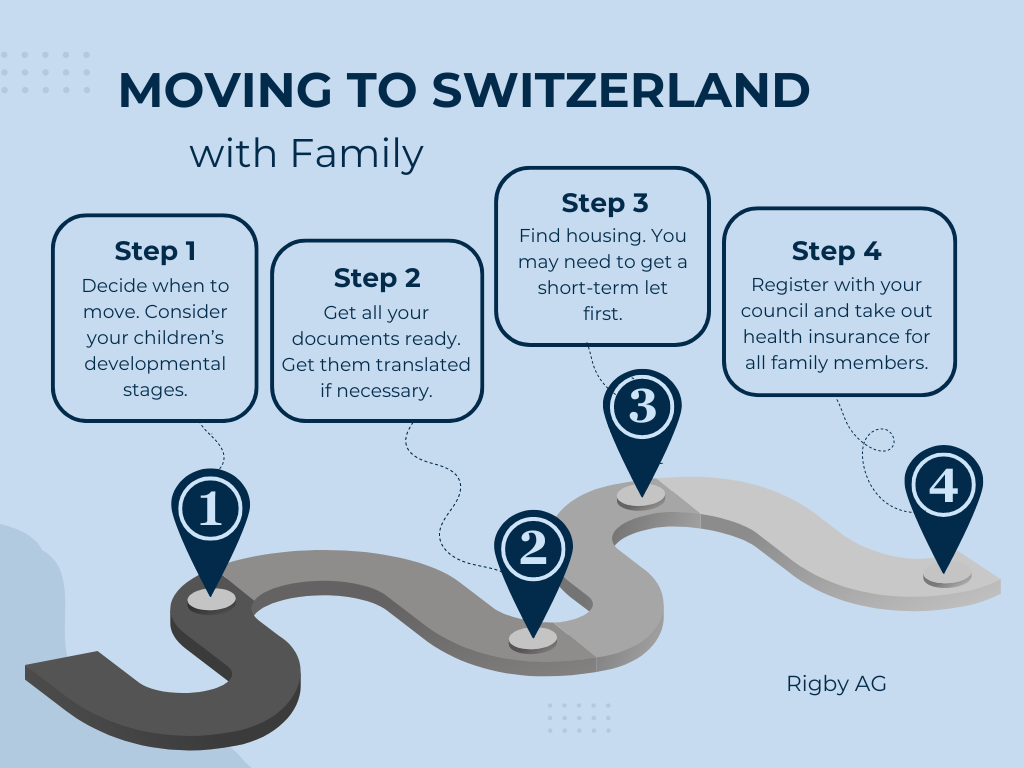Moving to Switzerland with Family: Practical Tips
Moving to a new country can be a great adventure, but it’s also a big challenge, especially if you have children. You have to consider many factors like your finances, your children’s current developmental stages, and safety in the new country. Let’s have a closer look at what moving to Switzerland with family might be like.

Should You Move to Switzerland with Your Family?
Switzerland is one of the most prosperous places in the world. If you’re looking for a safe country that offers great opportunities for the whole family, Switzerland should be at the top of your list of destinations. Some of the highlights for children are the great school system, the active lifestyle, the strong focus on independence, and the diverse culture.
Read the second part of this series, Living in Switzerland with Family, to learn about childcare, the school system, and cultural norms.
Toddlers
Moving when your children are very young is often easiest because they don’t yet have established social networks. They are generally more attached to their nuclear family than their surroundings.
In Switzerland, most children start public kindergarten at age 4, so you’ll need to sort out childcare for your toddlers. If both parents are working, you may need to rely on daycare centres (Kitas) or hire a nanny.
Another important step will be to find a reliable paediatrician. Swiss healthcare is very good, and most doctors speak English. Bring your toddler’s past medical records to the initial consultation. If they aren’t in English, French, or German, you may need to have them translated.
Children
Elementary-age children can better understand the moving process, and it can be a great learning experience for them. Explain to your children why your family is moving and what to expect in Switzerland because this will help them to feel part of the process.
Integrating into Swiss public schools is typically easier for children in the first three school years. After this age, your children might need additional support, especially if they don’t speak the target language.
Older children and tweens are sometimes reluctant to move because they have more established friendship groups. With this age group, it’s important to have honest discussions about the upcoming move. Highlight the positives, such as the great extracurricular options or the opportunity to make new friends, and listen to your children’s concerns.
Teenagers
Many teenagers have already developed their own social lives, so it can be hard to convince them to move. Discuss your plans with them before making any decisions. If you can, take them with you when you look for a new home, and organise a tour of their new school before you move.
Because the Swiss school system is unique and ability streaming starts early, teenagers may be better off in a bilingual or international school.
Getting Set Up
Switzerland is a very rule-based country. You’ll have an easier time integrating if you familiarise yourself with the laws and regulations in your area. Prepare important documents, so you can show them to your municipality, future landlord, and health insurance provider. They might include:
- The passports of all family members
- The birth certificates of your children
- Visas (if applicable)
- Your marriage certificate (if applicable)
- Certified translations (if applicable)
- Your job contract
- Proof of residence

Finding a Family Home
If you’re moving to Switzerland for a job, you’re most likely tied to one of the major cities like Zurich or Basel. Finding a home can be tough because there’s a lot of competition. Most people in and around the large Swiss cities live in apartments, although you can also find whole houses to rent or buy. Here are some tips:
- Be flexible on location. The public transport system is great in Switzerland, so you can live on the outskirts of the city or even in the countryside and still enjoy a short commute.
- Get used to a smaller space. Most Swiss properties aren’t as big as they are in countries like the USA or Australia. However, there are excellent public and community spaces, so you won’t feel cramped.
- If you can’t find a home straight away, get a short-term let first. It’s easier to look for a property when you’re already in the area.
Health Insurance for Families
In Switzerland, both adults and children have to take out health insurance. The current average cost is around CHF 350 per month for one adult. Children and adolescents are significantly cheaper to insure.
Set up a policy for your family as soon as you arrive. If you wait for more than 90 days, your municipality might choose insurance for you. This is likely to be more expensive and less suitable for your family than if you compare providers and select a policy yourself.
In addition to insurance, some services are subject to co-payment. Adults have to pay a deductible and CHF 15 for every day they spend in the hospital, but children under 18 are usually exempt. There is also a retention fee of 10% of the healthcare costs exceeding the deductible, up to a maximum of CHF 700 per year for adults and CHF 350 per year for children.
Learning the Language
You and your children will need to learn the local language, most likely German, French, or Italian, if you want to fully integrate. Typically, this is easier for younger children. However, children of all ages may need support. Schools offer supplementary language classes for non-native students. However, some parents opt for additional tutoring, especially if their children are older or aiming for one of the higher-ability streams in secondary school.
Ready to make your move? Read Part 2 of this post, Living in Switzerland with a Family.
Moving to Switzerland with family can be rewarding, but only if you’re properly prepared. Sign up for our Rigby AG newsletter to access our Living in Switzerland ebook with information about every step of the process.